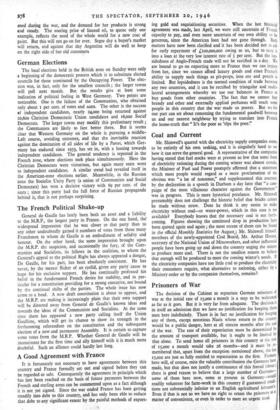A Good Agreement with France
It is fortunately not necessary to have agreements between this country and France formally set out and signed before they can be regarded as safe. Consequently the agreement in principle which • has just been reached on the basis of future payments between the French and sterling areas can be commented upon as a fact although it is not yet signed. Since the war ended France has been getting steadily into debt to this country, and has only been able to reduce that debt to any significant extent by the painful methods of export-
ing gold and requisitioning securities. When the last financial agreement was made, last April, we were still uncertain of French capacity to pay, and even more uncertain of our own ability to be generous, since the American loan had not gone through. Both matters have now been clarified and it has been decided not to ask for early repayment- of £100,000,000 owing to us, but to turn it into a loan at the very low interest rate of I- per cent. But the lop- sidedness of Anglo-French trade will not be rectified in a day. We are bound to go on exporting more to France than we can import from her, since we cannot afford luxury goods and since France's ability to supply such things as pit-props, iron ore and potash is limited. But lopsidedness is the normal condition of trade between any two countries, and it can be rectified by triangular and multi- lateral arrangements whereby we use our balances in France to buy goods from other countries. The fact that we cannot buy brandy and other and externally applied perfumes will teach some people in this country that the war made us poorer. But we for our part can set about cementing the fundamental goodwill between us and our nearest neighbour by trying to translate into French the home-truth that " It's the poor as 'elps the poor."


























 Previous page
Previous page